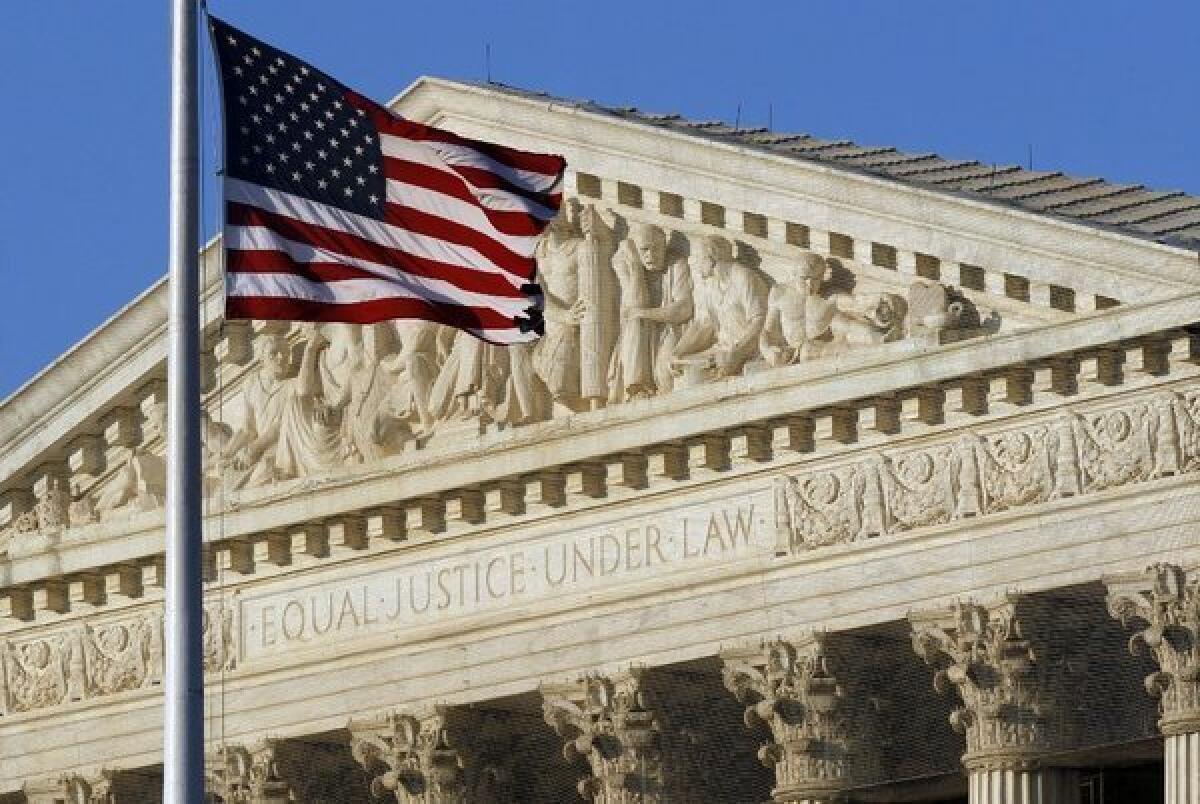Can a company patent your DNA? Supreme Court hears BRCA gene case

- Share via
Can a private company own rights to your DNA?
The nine justices of the Supreme Court will consider that question Monday as lawyers for Myriad Genetics make their best case that the company should be able to keep its patent on two genes known to influence the risk of developing breast cancer and ovarian cancer.
Challenging that notion will be lawyers representing the Assn. for Molecular Pathology and other scientific organizations, which argue that allowing genes to be patented slows or shuts down scientific research involving those genes.
Myriad Genetics is a Salt Lake City biotech company founded by University of Utah researchers. The company filed for a patent for the BRCA1 (short for BReast CAncer1) gene in 1994, and for the BRCA2 (short for BReast CAncer2) gene in 1995. Their flagship product, BRACAnalysis, tests for key mutations in both genes.
“People with a mutation in either the BRCA1 or BRCA2 gene have risks of up to 87% for developing breast cancer and up to 44% for developing ovarian cancer by age 70,” according to Myriad’s website. “Mutation carriers previously diagnosed with cancer also have a significantly increased risk of developing a second primary cancer.”
Myriad, along with the University of Utah and the National Institute of Environmental Health Sciences, applied for patents on the two genes. They got their first BRCA1 patent in 1997 and their first BRCA2 patent in 1998. Since then, about 1 million people have taken the BRACAnalysis test. The test costs more than $3,000, though the company notes that the typical patient pays only about $100 of that.
While conducting all of these tests, Myriad has also had the opportunity to identify new DNA variants that can be used to predict cancer risk.
But many doctors, patients and scientists aren’t happy with the situation.
Some are offended by the very notion that a private company can own a patent based on a gene that was invented not by researchers in a lab but by Mother Nature. Every single cell in every single person has copies of the BRCA1 and BRCA2 genes.
Myriad officials say they deserves the patent because they invested a great deal of money to figure out the sequence and develop “synthetic molecules” based on that sequence that can be used to test the variants in a patient.
“We think it is right for a company to be able to own its discoveries, earn back its investment, and make a reasonable profit,” the company wrote on its blog.
But Myriad’s detractors are not persuaded. Aside from their objection to gene patents in principle, they note other problems with the situation. One of the consequences of giving a single company exclusive rights to sell a DNA test for these crucial genes is that patients who take the test have nowhere to go for a truly independent second opinion.
In addition, scientists say that allowing genes to be patented has blocked crucial research and kept data on variants linked to cancer locked up in the hands of a private company.
Now scientists are urging those who have received test results from Myriad to report their results to a new database called Sharing Clinical Reports Project. The resulting database would be available to all researchers to help them identify new genetic risk factors for breast and ovarian cancer. You can read more about their effort here.
The legal case against Myriad was filed in 2009 by the Public Patent Foundation and the American Civil Liberties Union. A federal judge in New York ruled in their favor and invalidated the patents in 2010.
After several rounds of appeals, a U.S. Court of Appeals panel ruled 2-1 that human genes can be patented. That is the decision Public Patent and the ACLU have appealed to the Supreme Court, leading to Monday’s oral arguments.
About 20% of genes are now covered by a U.S. patent, Public Patent says.
You can read more about the case on Public Patent’s website or on the ACLU website.
Return to Science Now.
twitter.com/@LATkarenkaplan







